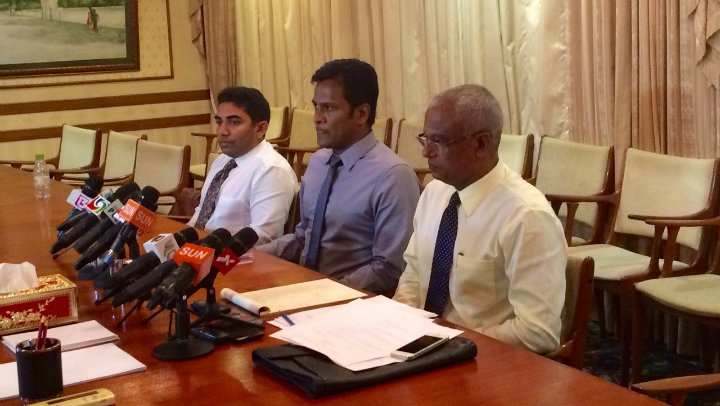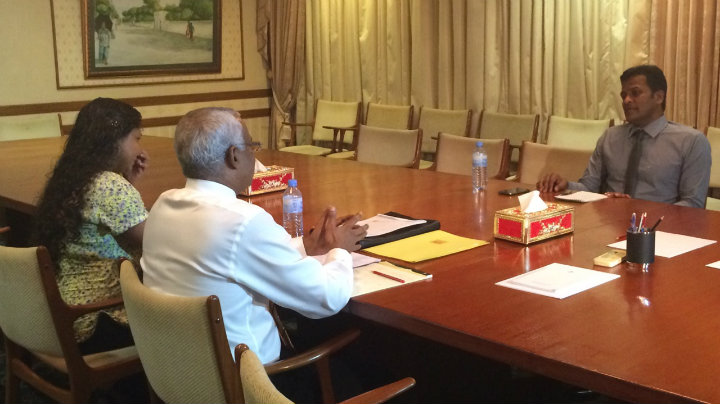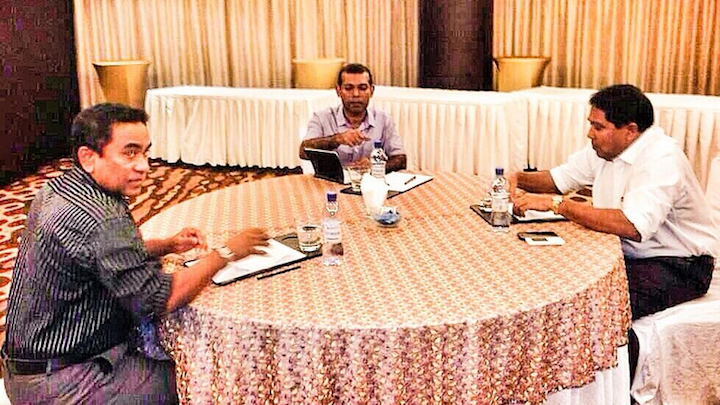The main opposition Maldivian Democratic Party (MDP) has raised hope of freedom for convicted opposition leader and former president Mohamed Nasheed by July 26, the day Maldives marks 50 years of independence from the British.
Speaking at a press conference after a third meeting of talks between the MDP and the government, MP Ibrahim ‘Ibu’ Mohamed Solih said: “When we celebrate the golden jubilee of independence on July 26, our aim, our hope is that everyone is able to celebrate the day happily and in freedom.”
Nasheed’s jailing on terrorism charges, relating to the arrest of a judge during his tenure, sparked months of daily protests and historic anti-government marches. Diplomatic pressure has been mounting on President Abdulla Yameen to release Nasheed and other political prisoners, including two former defence ministers and ruling party MP.
While Ibu struck a hopeful tone, the government representative, home minister Umar Naseer was more cautious. He said the government had made no commitments on releasing jailed politicians, but reiterated that the government stands ready to make compromises for long-term stability.
Nasheed was transferred to house arrest in late June after the opposition backed a constitutional amendment that will allow President Abdulla Yameen to replace his deputy.
Naseer tonight hailed slow and steady progress in talks and said: “I now believe there is nothing we cannot resolve.”
“On whether political leaders will be released, we did not give any commitments. But we did give one commitment, that is to make concessions, to make compromises where possible. We want to ease political tensions. For there to be engagement and dialogue between the MDP and the government. If such an environment is created, it will be easier for us to make concessions. I cannot directly state that the government will make a specific compromise. But I will say if such an environment is created, the government stands ready to make all compromises. In the past three weeks, we have made compromises, and we have seen progress. This does not happen with just one meeting. This is the third official meeting between MDP and the government. In other countries, it can take 100 meetings,” he said.
Since Nasheed’s transfer to house arrest, the government has removed a freeze on Jumhooree Party leader and MP Gasim Ibrahim’s tourism businesses. Gasim, who had spent nearly three months abroad amidst rumors of impending arrest, returned to the Maldives on Sunday morning.
Gasim’s JP had also backed the constitutional amendment. The parliament is due to vote to impeach vice president Dr Mohamed Jameel Ahmed by July 26. Many believe the president is seeking to replace Jameel because he wants a more loyal deputy ahead of a major surgery for a life-threatening condition.
Ibu said: “Even if we do not say a specific action will be taken on a specific date, you will see actions from both parties… You will see results. We are not able to share some of the discussion points with the media yet, so we have not shared them, but we are on a good foundation. I am certain of that. Now we have to proceed. And I received that certainty tonight as well.”
The MDP has repeatedly said Nasheed’s freedom is the party’s highest priority.
The two representatives also said they have established a hotline to facilitate communication and to resolve any issues that may come up.
“There’s been progress, You will be able to see this in the future. Talks are proceeding in a friendly and conciliatory environment. I note we are already seeing results. The public will see even more progress when we sit for a next meeting,” Ibu said.
The fourth meeting of talks has been scheduled for July 21.
Naseer meanwhile said the government, at the ongoing talks, is not pressuring Nasheed to appeal his 13-year jail term at a domestic appellate court. The foreign ministry this weekend urged the opposition leader to appeal in a response to the UN working group on arbitrary detention.
Naseer also said the government will look at provisions in the Clemency Act and the Parole Act in reducing jail terms or releasing other jailed politicians, but only after they exhaust appeal processes.
“We can only take measures through the law. We have the Clemency Act, and the Parole Act. We will review that when it gets to that stage. This government wants to calm political tensions, to establish stability and to establish a conducive environment by which we can provide the public with the services and the development they seek. As I said before, these talks are not about the present, but also the political future of the Maldives.”
The MDP has proposed six measures for political reconciliation at the ongoing talks. In addition to asking for the release of politicians and withdrawing “politically motivated charges” against some 1400 opposition supporters, the party has also called for an independent inquiry into the murder of MP Afrasheem Ali and the disappearance of Minivan News journalist Ahmed Rilwan.
Discussions have not progressed on the latter demand yet.
Naseer meanwhile said the government is reviewing the charges against the 1493 people. “This government does not want to charge and punish those who have committed minor offences in political activities. President Yameen has given me a special instruction on this,” he said.
However, the government does not want to be lenient on individuals who may be pretending to be political prisoners, especially those with criminal records, he said.
The government has also committed to speeding up progress in the separate talks with the JP and the religious conservative Adhaalath Party.
Another major demand by the MDP in the ongoing talks is a change from the Maldives’ presidential system of government to a parliamentary system. Discussions on the system of governance will take place at a second stage of talks, the representatives said at an earlier press conference.



